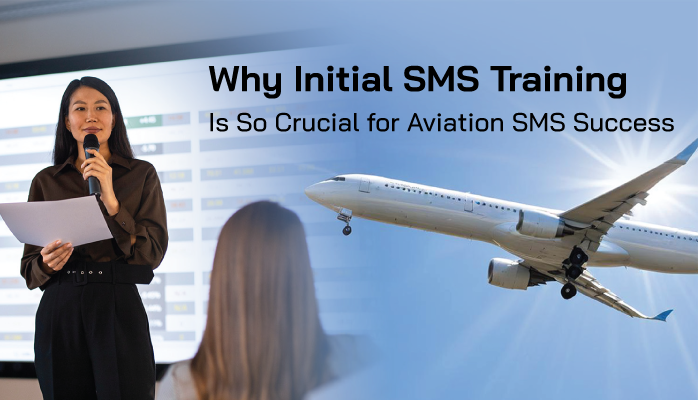What Initial SMS Training Is, and How It’s Different

Since November 2006, most aviation service providers have been required to implement formal aviation safety management systems (SMS). In order to assure compliance, aviation SMS oversight is provided by:
- Regional civil aviation authorities;
- Standards setting bodies (IATA, IS-BAO, Flight Safety Foundation, etc.); and
- Customers requiring SMS implementations from their vendors.
Aviation SMS oversight is conducted by quality assurance auditors using pre-defined, industry-accepted checklists that align with SMS regulatory requirements. Auditors use these checklists in their SMS audits, assessments, and evaluations. A common question operators hear from SMS auditors is whether employees:
- are aware of the implemented aviation SMS; and
- have been trained in hazard identification, safety reporting processes, and the purpose of the aviation SMS implementation?
Related Aviation SMS Training Articles
- What Is Aviation Safety Training in Aviation SMS - Includes Videos to Use
- 4 Pillars | 10 Things You Need to Know About Aviation Safety Training
- Understanding Role of Hazard Identification Training and Safety Reporting Forms
Aviation SMS Training Is Regulatory Requirement Requiring Documentation
Aviation SMS training usually is and should be, an initial training requirement for all new employees that could potentially affect safe aviation operations. Existing employees will also need SMS training whenever regulatory or contractual compliance is a concern. Otherwise, if your account executive is only interested in a "paper SMS" or you operate in a region with little oversight, the SMS training requirement is not an urgent matter. If this scenario fits your company, you probably are not reading this article.
To satisfy the initial SMS training requirement for reactive risk management training, newly hired employees will need to be trained on:
- What a safety management system is;
- An overview of your organization's reactive risk management process, starting with hazard identification;
- The goals of the company’s SMS;
- Employee’s roles and obligations to the aviation SMS;
- Employees' non-punitive protections from management for self-reporting errors and mistakes; and
- Actions and scenarios that are not covered by the employees' non-punitive reporting policy.
Initial SMS Training Meant to Acquaint and Create Awareness
Providing initial training is simply a way of acquainting employees with the SMS implementation and there is no expectation that employees will become "SMS experts." If you already have existing employees when you begin implementing the aviation SMS, those employees should also perform the initial training as an introduction to the new SMS implementation.
With existing employees, you may consider emphasizing how the new SMS implementation differs from the legacy safety program that may already exist at your organization. If you have not already figured this out, a formal SMS implementation goes well beyond the scope of traditional safety programs. For one thing, management is accountable for:
- Ensuring the SMS is properly implemented and performing in all areas of the organization; and
- Regularly review organizational safety performance and address substandard safety performance.
Typically, initial training will also touch on:
- Where employees can read safety policies and procedures;
- Important safety policy (signed by the accountable executive) that should be read;
- How to report safety issues;
- What safety issues are mandatory and optional to report;
- The company’s SMS org chart to understand how safety information flows within the organization;
- The non-punitive reporting policy; and
- High-level briefing of the SMS implementation plan.
This training does not need to be overly extensive or long and can be efficiently accomplished in less than an hour.
Related Aviation SMS Training Articles
- Tips to Automate Aviation SMS Training for Initial/Recurrent Requirements (Free Resources)
- Most Important Safety Training in Aviation Risk Management
- Where to Focus Hazard Identification Training & Risk Mitigation
How Companies Implement Initial SMS Training
The responsible safety manager is in charge of creating initial SMS training. It’s a process of:
- Identifying training objectives and minimum requirements;
- Creating the training curriculum and delivery process;
- Gathering the important “discussion points” for the initial SMS training (see bullet points in the previous section); and
- Formatting the training objectives into a training document, checklist, video, etc.
- Delivering the SMS training;
- Documenting training (who, what, when); and
- Tracking the expiration of initial SMS training.
Implementing initial SMS training really should not take much time. As long as the safety manager is aware of the relevant resources, it’s simply a process of showing new employees where to find them and briefly explaining the basic tenets of aviation SMS implementations.
Another point worth stressing! It’s very important to document employees' initial training so that when an auditor says, “Where’s your proof that employees have been trained on SMS,” you have something to show them. You can track training performance in either a spreadsheet or an SMS database. Of course, the SMS database is more robust and can be configured to notify management and users of SMS training deficiencies, such as expiring training or employees who have not yet completed their initial SMS training requirements.
Goals of Initial Training

There are three primary goals for setting up an initial SMS training plan:
- Avoid regulatory and contractual audit findings;
- Attempt to positively influence safety culture from day one; and
- Mitigate the risk of introducing new employees into positions affecting safe flight operations.
It hardly needs to be said that these goals make a lot of sense. It takes very little effort to implement initial training, but the potential benefits are high.
Related Aviation SMS Training Articles
- 5 Signs of Good Aviation Risk Management Training
- 3 Top Topics for Aviation SMS Training to Focus On
- How to Be Compliant With ICAO Training and Education Requirements
When SMS Initial Training Is Performed
Aviation SMS initial training should be performed as soon as employees are hired by the company. By “as soon as…hired,” we are talking about either:
- Before employee’s start date;
- On employee’s first day; or
- Within 2 weeks of employee's first day.
Remember, “initial” means “occurring at the beginning.” Your initial training should occur at:
- The start of the SMS implementation; or
- The start of an employee’s tenure with your company, as discussed.
Fulfilling an initial SMS training obligation six months into an employee’s employment definitely defeats the purpose – but you would be surprised how common this scenario actually is.
Delaying SMS training for new hires sends a message that adversely affects your safety culture. A best practice is to include initial SMS training during the employees' new-hire indoctrination. This sends a message that safety is an integral part of your operations and unsafe behaviors will not be tolerated.
Conducting SMS training early on also provides management an opportunity to positively influence new hires' attitudes. It is very important to shape new hires' attitudes towards wholeheartedly accepting the aviation SMS implementation and believing that management is genuinely interested in promoting safety.
Empirical evidence suggests that most resistance to aviation SMS comes from long-term employees. Initial SMS training allows management to influence new hires before they adopt undesirable attitudes of the "old-school" employees who have always "done it the same way" and are resistant to change.
Why Initial Training Is Import for Aviation SMS Implementations
During phase 2 of an ICAO compliant SMS implementation, you are required to provide reactive risk management training. Reactive risk management is, in short, the ability to:
- Identify potential hazards;
- Alert management of the potential safety hazard (safety reporting);
- Respond quickly to reported safety concerns;
- Adequately mitigate risks that arise;
- Take proper action on safety issues; and
- Monitor the system to ensure the effectiveness of mitigating actions.
Initial reactive risk management training is a crucial step in achieving this requirement.
Employee turnover is a major risk to every aviation service provider. The better prepared new employees can react, the less risk they pose to flight operations.
Related Aviation SMS Training Articles
- Aviation Safety Management Training Made Simple
- How Effective Is Hazard Identification Training in Aviation SMS?
- 6 Tips to Improve Aviation SMS Training Courses
The Success of Aviation SMS Dependent on Safety Reporting and Safety Culture
The success of every aviation SMS revolves around safety culture, Without a healthy safety culture, substandard safety reporting metrics will continue to plague the organization. Unless employees are engaged in the aviation SMS, there will be little incentive for employees to alert management of potential safety concerns.
Human beings are strongly influenced by first impressions. Initial SMS training may be the first impression employees will experience in relation to your aviation SMS implementation. It stands to reason that when employees are underwhelmed by SMS training, they will be less inclined to participate in the SMS.
In review,
- SMS training directly affects safety culture; and
- Effectiveness of initial SMS training determines whether employees willingly report safety concerns.
As we have seen, SMS training affects both safety culture and safety reporting metrics. Along the same vein, your safety reporting system will also affect safety performance.
When employees can easily report safety concerns, they will be more inclined to repeat their behavior whenever their "reporting experience" is positive.
Is your safety reporting system simple, and easy-to-use?
Can employees access the safety reporting system easily? Or must they log into a company intranet to submit safety concerns?
Need help with your SMS data management? We can help. Please review these short demo videos to learn how you can manage all SMS documentation requirements within one centralized SMS database.
Last updated in January 2025.







